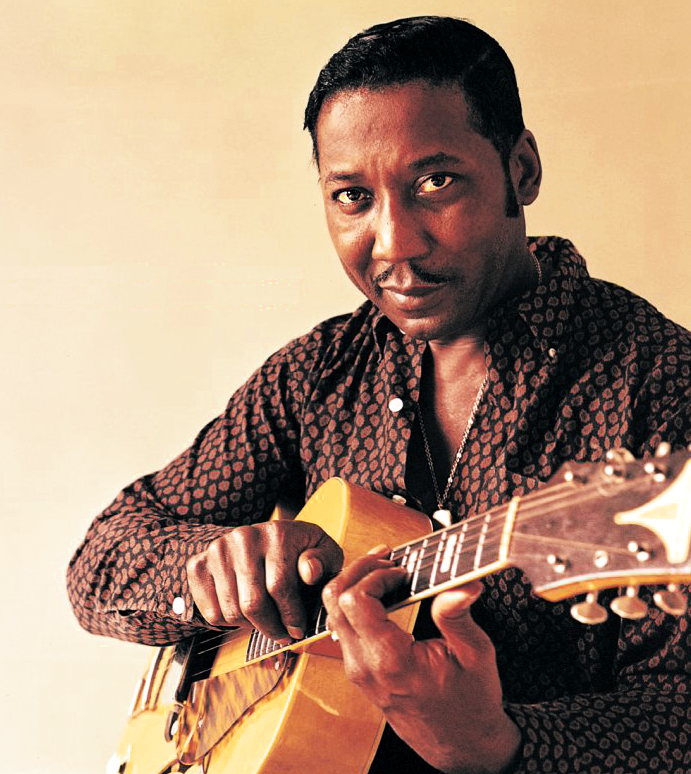Post by Admin on Jun 25, 2015 21:02:58 GMT
The artist who probably led to my discovery of the blues was Muddy Waters. Listening to WLAC radio in the 40s and 50s, I was exposed to African-American music for the first time. There was something about the rhythms that just spoke to me - an old country music guitar picker who loved the old time mountain music, played many square dances around Tennessee and somehow found the music of the blues exciting and moving. It's appropriate that we have this legend covered here...just hope we get all the facts right.

McKinley Morganfield (April 4, 1913[2] – April 30, 1983), known by his stage name Muddy Waters, was an American blues musician. He is often considered the "father of modern Chicago blues".[3]
Muddy Waters grew up on Stovall Plantation near Clarksdale, Mississippi and by age seventeen was playing the guitar at parties, emulating local blues artists Son House and Robert Johnson.[4] He was recorded by Alan Lomax there for the Library of Congress in 1941.[5][6] In 1943, he headed to Chicago with the hope of becoming a full-time professional musician, eventually recording, in 1946, for first Columbia and then Aristocrat Records, a newly formed label run by brothers Leonard and Phil Chess.
In the early 1950s, Muddy and his band, Little Walter Jacobs on harmonica, Jimmy Rogers on guitar, Elgin Evans on drums and Otis Spann on piano, recorded a series of blues classics, some with bassist/songwriter Willie Dixon, including "Hoochie Coochie Man", "I Just Want to Make Love to You" and "I'm Ready". In 1958, Muddy headed to England, helping to lay the foundations of the subsequent blues boom there, and in 1960 performed at the Newport Jazz Festival, recorded and released as his first live album, At Newport 1960.
Muddy's influence is tremendous, not just on blues and rhythm and blues but on rock 'n' roll, hard rock, folk, jazz, and country; his use of amplification is often cited as the link between Delta blues and rock 'n' roll.[7][8]
1. Gilliland, John (1969). "Show 4 - The Tribal Drum: The rise of rhythm and blues. [Part 2]" (AUDIO). Pop Chronicles. Digital.library.unt.edu.
2. Gordon pp. 4–5
3. Muddy Waters — Can't Be Satisfied (DVD, 2003). Winstar.
4. "His thick heavy voice, the dark colouration of his tone, and his firm, almost solid, personality were all clearly derived from House," wrote music critic Peter Guralnick in Feel Like Going Home, "but the embellishments, which he added, the imaginative slide technique and more agile rhythms, were closer to Johnson."
www.pbs.org/wnet/americanmasters/episodes/muddy-waters/cant-be-satisfied/730/

McKinley Morganfield (April 4, 1913[2] – April 30, 1983), known by his stage name Muddy Waters, was an American blues musician. He is often considered the "father of modern Chicago blues".[3]
Muddy Waters grew up on Stovall Plantation near Clarksdale, Mississippi and by age seventeen was playing the guitar at parties, emulating local blues artists Son House and Robert Johnson.[4] He was recorded by Alan Lomax there for the Library of Congress in 1941.[5][6] In 1943, he headed to Chicago with the hope of becoming a full-time professional musician, eventually recording, in 1946, for first Columbia and then Aristocrat Records, a newly formed label run by brothers Leonard and Phil Chess.
In the early 1950s, Muddy and his band, Little Walter Jacobs on harmonica, Jimmy Rogers on guitar, Elgin Evans on drums and Otis Spann on piano, recorded a series of blues classics, some with bassist/songwriter Willie Dixon, including "Hoochie Coochie Man", "I Just Want to Make Love to You" and "I'm Ready". In 1958, Muddy headed to England, helping to lay the foundations of the subsequent blues boom there, and in 1960 performed at the Newport Jazz Festival, recorded and released as his first live album, At Newport 1960.
Muddy's influence is tremendous, not just on blues and rhythm and blues but on rock 'n' roll, hard rock, folk, jazz, and country; his use of amplification is often cited as the link between Delta blues and rock 'n' roll.[7][8]
1. Gilliland, John (1969). "Show 4 - The Tribal Drum: The rise of rhythm and blues. [Part 2]" (AUDIO). Pop Chronicles. Digital.library.unt.edu.
2. Gordon pp. 4–5
3. Muddy Waters — Can't Be Satisfied (DVD, 2003). Winstar.
4. "His thick heavy voice, the dark colouration of his tone, and his firm, almost solid, personality were all clearly derived from House," wrote music critic Peter Guralnick in Feel Like Going Home, "but the embellishments, which he added, the imaginative slide technique and more agile rhythms, were closer to Johnson."
www.pbs.org/wnet/americanmasters/episodes/muddy-waters/cant-be-satisfied/730/

